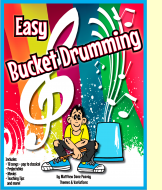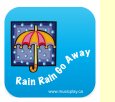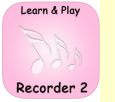 |
|
17-10-29 Ten Easy Assessments
|
Toronto Musicplay Workshop - Nov. 5-6, 2017
Would you like additional lessons like this one? If you're in the Toronto area, Denise is doing 2 workshop days: Sunday, Nov. 5th and Monday, Nov. 6th where she'll share lessons like this where the students sing, play, read/write, create, listen and move.
REGISTER for Toronto Workshops - Nov. 5 and/or 6th. Participants will get 2 free months subscription to the online site AND will get great lessons to use in your classrooms.
Ten Easy Assessments:
If you only see your K-6 music students for 30-60 minutes/week, you have very limited time to assess student progress. In this article, I want to give suggestions that will help you make the most of the limited time that you have.
You should plan your assessments when you create your year plan. If in the first term of your year plan, you decided to focus on steady beat, then your assessments for term one should focus on steady beat. You can’t assess every musical skill and concept each term. When planning assessments, find out what your school or districts allows or requires on the report card. If you can only report on 3 outcomes, don’t assess 20 outcomes.
In planning assessments, you will want to assess both skills and mastery of concepts. Skills include singing, playing, moving, listening, reading/writing and creating. Concepts include beat/rhythm, pitch, expression (dynamics, tempo, articulation), tone color (timbre), form.
Not all skills and/or concepts have equal importance. The skills that I feel are the most important in K-6 music are singing in tune, and keeping a steady beat. I might assess thost skills every term, and assess the other skills/concepts during the times that I’ve focussed on them.
1. Outcome: Students sing independently, on pitch.
To Assess: Sing “hello David” on so-mi, so-mi.
Student responds by singing “Hello Mrs. Gagne” back to you.
- 1. Developing does not always use singing voice, rarely matches pitch
- 2. Beginning occasionally sings in-tune
- 3. Proficient sings in tune most of the time.
- 4. Excellent consistently sings in tune independently.
2. Outcome: Students sing in the group, on pitch.
I call this, the Three Second Listen.
To Assess: Play a recording of a song that you’ve worked on that the students should know. For example: The National Anthem or in Musicplay 2, Ridin’ That New River Train. Have the students stand in class list order. Walk down the rows listening to each child sing for 2-3 seconds. Record your assessment in your grading program or on your class list.
- 1. Developing beginning to use singing voice
- 2. Beginning occasionally matches pitches.
- 3. Proficient sings in tune almost all of the time.
- 4. Excellent consistently sings in tune.
3. Outcome: Students keep a steady beat when moving to music.
To Assess: Play the song, “Time for Music.” It’s song #1 in Musicplay PreK part 1 and in Singing Games children Love Vol. 3. (also available on iTunes and/or at www.musicplayonline.com) In this song children keep a beat, clapping, patting, tapping, flapping, and drumming on their knees. Have the students sit in class list order, observe and assess as they sing and move to the song. Another way to assess steady beat when moving to music is to play a listening example and have the children find their own way to keep a beat.
- 1. Developing rarely keeps a steady beat
- 2. Beginning occasionally keeps a steady beat
- 3. Proficient keeps a steady beat almost all of the time.
- 4. Excellent consistently keeps a steady beat
4. Outcome: Students keep a steady beat when playing instruments
To Assess: Sing and play an instrument song such as, Play, Play, Play Along in Rhythm Instrument Fun. (This is also in Musicplay PreK, and is found online at www.musicplayonline.com) Have the students sit in class list order and give each child a pair of sticks. Observe and assess as they sing and play to the song. Alternately, play along with a piece of classical music or a folk tune. Find a piece of music that has a tempo approx.. 120 beats per minute.
- 1. Developing rarely keeps a steady beat
- 2. Beginning occasionally keeps a steady beat
- 3. Proficient keeps a steady beat almost all of the time.
- 4. Excellent consistently keeps a steady beat
5. Outcome: Students tap a steady beat on a beat chart
To Assess: Sing a short, familiar simple 16 beat reading song or chant such as Engine #9, Lucy Locket. While they sing, have the children tap the beat on a beat chart. (Download a beat chart for the songs listed above from musicplayonline.com – printables) Have the students sit in class list order, observe and assess as they sing and tap the beat.
- 1. Developing rarely keeps a steady beat
- 2. Beginning occasionally keeps a steady beat
- 3. Proficient keeps a steady beat almost all of the time.
- 4. Excellent consistently keeps a steady beat
6. Outcome: Students can read a 4 (or 8) beat rhythm pattern using ta, ti-ti, rest
To Assess: Create a set of 10 or more rhythm flashcards. Go down your class list, having each child read one or two flashcards. Gr. 1-2 – use 4 beat rhythm cards Gr. 3-5 first report card, have students read 8 beats.
Have the students sit in class list order, observe and assess as they sing and tap the beat.
- 1. Developing rarely keeps a steady beat
- 2. Beginning occasionally keeps a steady beat
- 3. Proficient keeps a steady beat almost all of the time.
- 4. Excellent consistently keeps a steady beat
Themes & Variations publishes a set of 100 rhythm flashcards that are printed on colored cardstock. The color coding indicates the patterns included in the set and helps you to quickly find the set that each class is working on.
Link to Flashcards - Canada
Link to Flashcards - USA and International
In www.musicplayonline.com, we’ve taken rhythm flashcards and made this into a very quick and easy to use movie - just press play. There are 25-35 patterns in each set. There are fewer patterns for very easy sets as younger classes are usually smaller (we hope!) and more patterns in the harder or longer sets for your older students. In the easier sets, we’ve given you both 4 beat assessments and 8 beat assessments. You can choose the set that you want to assess.
7. Outcome: Students can notate a rhythm pattern that they hear (ta, ti-ti, rest)
To Assess: To do music Dictation using cardstock flashcards, I choose five cards at the level I want to assess. I give the students a piece of paper (I use paper from the recyling in the school) and a pencil (I keep a class set in a container by the door) and an old hard cover text to write on. They write their name at the top and number 1-5. I clap a pattern - they clap it back, then write it down. I’ll give it a second time if they need it. I write down my patterns as I go or keep my flashcards in order. Students exchange papers and correct them in class, so I don’t have to take home bags full of marking. Yay!
Music Dictation at www.musicplayonline.com is done the same way.
Five questions are given. Pause the movie between questions. Immediately following the five questions are the answers. Exchange papers and mark.
8. Outcome: Students can sing at sight a melodic pattern
To Assess: If you use solfege in your music classes, assessing the students ability to read and sing melodic patterns may be an outcome that you choose to assess. In my classes, in first term I might assess the following patterns in term 1: Gr. 1 – so-mi, Gr. 2 – la-so-mi Gr. 3 – so-mi-re-do Gr. 4-5 – low la, do-re-me-so-la Every teaching situation is different, so this may not be an assessment that is relevant to your teaching. Create or purchase melody flashcards to assess the tonal patterns that you have taught. Melody flashcards are available to purchase from www.musicplay.ca. OR you can use the Solfa Reading videos at www.musicplayonline.com.
9. Outcome: Students can identify singing, speaking, whisper, shouting voices
To Assess: The Types of Voices lesson in Musicplay for Kindergarten, song #7, This is My Speaking Voice, includes a printable assessment. In this assessment, the teacher uses one kind of voice, and the students circle the type of voice that they heard.
- 1. Developing: few answers are correct
- 2. Beginning some answers are correct
- 3. Proficient most answers are correct
- 4. Excellent all answers are correct
10. Outcome: Students can identify when music is fast or slow
To Assess: #29 in Musicplay PreK is called Fast or Slow. Eight musical examples are played for the students and the students tell if they are fast or slow. You could use 4-6 of these examples in an assessment.
- Mary Had a Little Lamb slow
- Mary Had a Little Lamb fast
- Twinkle Twinkle fast
- Twinkle Twinkle slow
- Ring Around the Rosie fast
- Ring Around the Rosie slow
- Eensy Weensy Spider slow
- Eensy Weensy Spider fast
Give each student a piece of paper (I use paper from the recyling in the school) and a pencil (I keep a class set in a container by the door) and an old hard cover text to write on. They write their name at the top and number 1-4 or 1-6. Play the movie to use the musical example but don’t project it. Pause to allow children to write slow or fast. (or make up a worksheet so they just have to circle slow or fast.) If you prefer, you could play your own examples on a keyboard. Mark the students work for your assessment.
- 1. Developing: few answers are correct
- 2. Beginning some answers are correct
- 3. Proficient most answers are correct
- 4. Excellent all answers are correct
These are just a few possible assessments, but I hope this gives you some ideas for easy assessments that you can do in your music classes, without taking up all of your limited teaching time!
Toronto Musicplay Workshop - Nov. 5-6, 2017
Would you like additional assessment ideas? If you're in the Toronto area, Denise is doing 2 workshop days: Sunday, Nov. 5th and Monday, Nov. 6th where she'll share lessons like this where the students sing, play, read/write, create, listen and move.
REGISTER for Toronto Workshops - Nov. 5 and/or 6th. Participants will get 2 free months subscription to the online site AND will get great lessons to use in your classrooms.

Easy Bucket Drumming is an amazing resource! In addition to the Music Rules activity, there are 18 sequenced activities that will teach your students how to play the parts of the bucket, how to develop hand independance so they can play two parts at the same time, and has arrangements of three pop songs.
The projectable PDF AND the videos of all the pieces, make this really easy to use in your classroom.
View a class lesson where I teach Liberty Bell March from this collection on YouTube: Liberty Bell
Canadian Teachers Easy Bucket Drumming
USA Teachers - link to Easy Bucket Drumming
with body percussion, movement etc, discuss and decide on the final form. Perform.
Link to Poster Packs on Canadian Site - WWW.MUSICPLAY.CA
Link to Poster Packs on USA Site - MUSICPLAY.CA
Link to Poster Packs on Canadian Site - WWW.MUSICPLAY.CA
Link to Poster Packs on USA Site - MUSICPLAY.CA
Orff or Kodaly Chapters: Would you like door prizes for your chapter workshops? We'd be happy to send you a gift certificate for a year's subscription to www.musicplayonline.com . Just email denise@musicplay.ca . Denise may be available for chapter workshops!
|
|
|
|
|
|
Canadian Office
#2-4664 Riverside Drive
Red Deer, Alberta T4N 6Y5
US Office
PO Box 309
Danville, WA, 99121
Phone/Fax 1-888-562-4647
(real people answer our phones!)
Email: tvinfo@telus.net
Website:
www.musicplay.ca
|
|
|
|
|
|
More is being added each week to our online resource.
I was called by a teacher who is using the Listening Logs in the Listening 2-3-4-5 as entrance music when her students come into the classroom. It's playing as they come in, then they answer questions about it.
If you haven't tried the site for a while and would like a free code for a month to try, send an email to denise@musicplay.ca. You'll be amazed!
http://musicplayonline.com/
|
|
|
|
|
|
Apps and Digital Resources
|
| | We've created SIX great apps for iPad or Google devices. If you have a class set of iPads, volume purchasing is available for these apps. The apps are being updated to the new IOS so will continue to be available!
LINK INFO

Note Name Smash! New note naming app! Only .99 USD
In this app, you choose the notes to practice. Each note correctly named breaks a hole in the wall. Name them all and the wall breaks!
Link to Note Name Smash in iTunes

Rain Rain Story - is a sound story book that uses the Rain Rain Go Away song, and a poem for students to accompany. This app includes ear training activities and instrument exploration.
Rain Rain Story - iTunes Rain Rain Story - Google

Note Name Match Game - 10 levels of Memory to match notes with their letter names. Great for recorder students, piano lessons, beginning band.
Note Name Match Game - iTunes
Note Name Memory Game - Google
Vocal Warm-ups for Singers or Choir
 This app is based on the warmups book, "Strictly Warmups" by Kerry Heisler. The warm-ups in this collection are organized into five sets. Each set includes a physical warm-up, breath awareness, then five minutes of a variety of mid-range warm-ups. This app is based on the warmups book, "Strictly Warmups" by Kerry Heisler. The warm-ups in this collection are organized into five sets. Each set includes a physical warm-up, breath awareness, then five minutes of a variety of mid-range warm-ups.
Vocal Warmups for Singers or Choir - iTunes
Vocal Warmups for Singers or Choir - Google
 Learn and Play Recorder has everything that you need for your beginning recorder classes. Learn and Play Recorder has everything that you need for your beginning recorder classes.
Learn and Play Recorder - iTunes Learn and Play Recorder - Google
 Learn and Play Recorder 2 is now available for iTunes and Android devices! Learn and Play Recorder 2 is now available for iTunes and Android devices!
This app gives your recorder players 24 songs for two part soprano with optional alto. Naming notes is reviewed, now with interactive practice! Counting music is reviewed, with an interactive name the note value activity. The full score with both regular alto and transposed alto for teachers to project is included.
Learn and Play Recorder 2 - iTunes Learn and Play Recorder 2 - Google
|
|
|
|
Fall 2017 Workshops
Langley, BC K-6 Music Fun workshop - October 20th - Registration will be available soon at www.musicplay.ca
Denise will be at SMEA - Saskatchewan Music Educators Conference in Regina - Sat. Oct 28th and OMEA - Ontario Music Educators Conference - Nov.2-4 in Deerhurst, ON
I'm planning workshops on Nov 5-6 in Toronto after OMEA.
Sunday Nov. 5 from 1-5
Monday, Nov. 6 from 9:30 - 2:30 (end early because of traffic)
Questions? Email: denise@musicplay.ca
LINKS for READERS:
Forward to a Friend . View as Web Page .
Company Website: www.musicplay.ca
Online Resource: www.musicplayonline.com
Workshops with Denise are always fun and full of ideas!
email denise@musicplay.ca to request a workshop!
|
|
|
|
|
 |
|
|
|
|